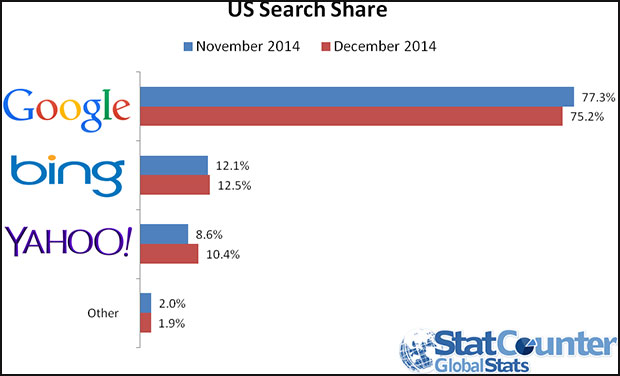Yahoo’s U.S. Search Traffic Share Hits Five-Year High Following Firefox Deal
Mozilla shocked the world (and especially Google) when it opted to end its longstanding relationship with Google as the default search provider for its Firefox browser, and instead inked a five-year deal with Yahoo to take its place. But while it was bold move for Mozilla, it's one that made complete sense for Yahoo, which is now reaping the rewards of its new relationship. As a result of the deal, Yahoo's U.S. search share is higher than it's been in five years, according to data provided by StatCounter.
As of December 2014, Google took a dominant 75.2 percent share of search in the U.S., followed by Bing at 12.5 percent and Yahoo at 10.4 percent (all others picked up the crumbs at 1.9 percent). December marked the beginning of Yahoo's relationship with Mozilla, as it became the default search engine in Firefox 34 in the U.S.

If we look back at November's market share figures, Google was at 77.3 percent, meaning it dropped a full 2.1 percent since losing out on Firefox. Meanwhile, Bing and Yahoo both gained share from 12.1 percent and 8.6 percent, respectively, with Yahoo showing the most forward moving momentum (it gained 1.8 percentage points as a result of the deal).
"The move by Mozilla has had a definite impact on US search," commented Aodhan Cullen, CEO, StatCounter. "The question now is whether Firefox users switch back to Google."
StatCounter added that Firefox users represented just over 12 percent of U.S. internet usage in December, based on data collected from over 15 billion page views per month across more than three million websites.
This isn't much ado about nothing, at least not for the companies involved. Search providers pay big money to be featured as the default option in browsers, and for the past 10 years, it was Google lining Mozilla's pockets with hundreds of millions of dollars for that spot. One of the reasons Mozilla chose Yahoo once its contract with Google expired is because Yahoo offered more flexible terms -- Mozilla wanted to sell the rights for default search privileges to different companies in different parts of the world.
As of December 2014, Google took a dominant 75.2 percent share of search in the U.S., followed by Bing at 12.5 percent and Yahoo at 10.4 percent (all others picked up the crumbs at 1.9 percent). December marked the beginning of Yahoo's relationship with Mozilla, as it became the default search engine in Firefox 34 in the U.S.

If we look back at November's market share figures, Google was at 77.3 percent, meaning it dropped a full 2.1 percent since losing out on Firefox. Meanwhile, Bing and Yahoo both gained share from 12.1 percent and 8.6 percent, respectively, with Yahoo showing the most forward moving momentum (it gained 1.8 percentage points as a result of the deal).
"The move by Mozilla has had a definite impact on US search," commented Aodhan Cullen, CEO, StatCounter. "The question now is whether Firefox users switch back to Google."
StatCounter added that Firefox users represented just over 12 percent of U.S. internet usage in December, based on data collected from over 15 billion page views per month across more than three million websites.
This isn't much ado about nothing, at least not for the companies involved. Search providers pay big money to be featured as the default option in browsers, and for the past 10 years, it was Google lining Mozilla's pockets with hundreds of millions of dollars for that spot. One of the reasons Mozilla chose Yahoo once its contract with Google expired is because Yahoo offered more flexible terms -- Mozilla wanted to sell the rights for default search privileges to different companies in different parts of the world.

